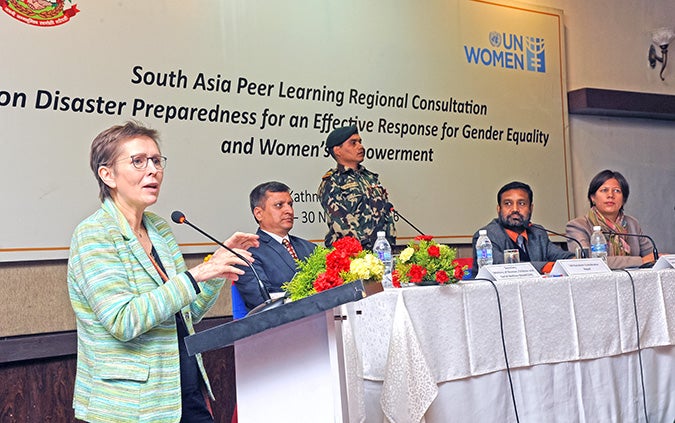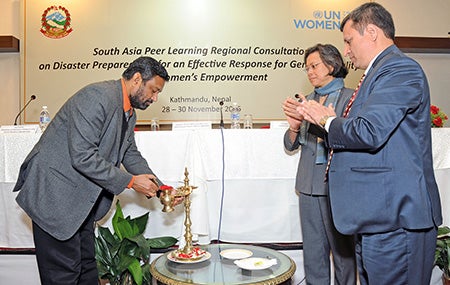South Asia Peer Learning Regional Consultation concludes with country-specific action points on gender responsive disaster preparedness and response
Date:
Kathmandu Nepal — The three-day South Asia Peer Learning Regional consultation meeting concluded today with country-specific action points on gender responsive disaster preparedness and response, and unanimous agreement on the critical need to engage women’s groups in decision-making to effectively design, implement and monitor gender-responsive disaster risk reduction (DRR) policies and programmes across the humanitarian-development continuum. The consultation was organized jointly by the Ministry of Women, Children and Social Welfare (MoWCSW), Government of Nepal and UN Women, the UN Entity for Gender Equality and Empowerment of Women, in collaboration with women’s groups, with funding from the Government of Denmark and technical support from the United Nations Development Programme (UNDP).

Addressing the Consultation, Secretary, Ministry of Women, Children and Social Welfare, Mr Bishnu Prasad Lamsal said, “The Government of Nepal (GoN) has initiated discussion on localizing the Sendai Framework for Action to create a space for mainstreaming gender equality and women’s empowerment concerns in the national DRR programme.” He further added that the GoN is committed to the implementation of 2030 Agenda for Sustainable Development and will ensure that the forthcoming Disaster Management Bill will ensure the collection and use of data disaggregated by sex, age and other factors and ensure women’s representation and leadership at all levels for building community resilience. “
Speaking at the programme, Ms. Wenny Kusuma, Representative of UN Women Nepal said, “This regional consultation is an important step to ensure that women’s leadership, voice and agency remain at the forefront of actions to reduce and respond to disaster risks, and that women are recognized as agents of change in future disaster risk reduction actions.” She further explained that the policies and international frameworks to address the needs of women in disasters are well-developed and what is now needed is to break the silos while working for gender mainstreaming in disaster management. “Now is the time to translate the commitments made by the Government into action," she added.

Similarly, Sophie Kemkhadze, UNDP Country Director, a.i. also highlighted the importance of gender-responsive disaster risk reduction, and its inherent linkages with human development and sustainable growth. She said that the concurrent agreements on the Sendai Framework for DRR and the Sustainable Development Goals provide us with a unique opportunity to galvanise global actions to achieve human development. “Given Nepal’s higher susceptibility and vulnerabilities associated with climate change and disasters, it is very important that all our development policies and programmes fully integrate aspects of DRR and gender equality. This is key to building a more resilient Nepal,” she said.
On behalf of the Women’s Core Group, a network of women leaders from civil society organizations, Ms. Chandni Joshi, said, “Nothing can be more powerful than peer learning. This peer learning consultation has been a stepping stone to ensure that the voices, needs and concerns of the rural women are considered at all levels of governance and their role in decision-making is strengthened. I propose UN Women to facilitate building a network of women’s group across the South Asia region to ensure sharing of experiences and lessons learnt as well as to foster joint advocacy on women’s leadership and participation.” She further stressed the need for strategic engagement of civil society organizations, private sector organizations and development partners in the formulation of government plans and programmes related to DRR.
Chief Information Commissioner of National Information Commission, Government of Nepal, Mr. Krishna Hari Baskota said, “Right to information is the oxygen as well as blood circulation of democracy that contributes to gender-responsive disaster risk reduction. It is essential that women and girls get full access to relevant information to prepare, respond and recover from disaster.”
The meeting also included the launch of a pictorial coffee book with stories of positive change in the midst of tragedy, demonstrating how women and girls are leading the way as powerful forces of change.
The three-day consultation attended by delegates from seven South Asian countries (Afghanistan, Bangladesh, Bhutan, India, the Maldives, Pakistan, Nepal and Sri Lanka) concluded with country specific priority actions, which call for women’s engagement in the localization, formulation and implementation of the strategic recommendations of the Sendai Framework. Key common actions agreed by the countries included strengthening evidence generation and knowledge on DRR from a gender perspective and strengthening disaster risk governance by ensuring meaningful participation and leadership of women and girls.
For more information:
Please contact, Monica Upadhyay
Communications and Partnership Officer
UN Women Nepal
Tel: 4255110/4216028; Mobile: 9841343953